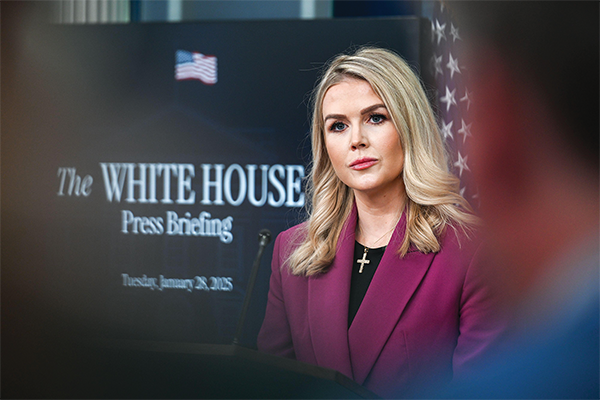AT TIMES, WHITE HOUSE press secretary Karoline Leavitt proudly wears a gold cross when meeting with the press pool. Many assume she emerges from the heart of right-wing American evangelicalism. But they would be wrong. Leavitt emerges from the heart of right-wing American Catholicism. While we have been focused on the fusion of evangelical Christianity and Far Right nationalism, we’ve missed how Christian nationalism has risen in Catholic and Orthodox traditions. Are former evangelicals — or “exvangelicals” — who resist Christian nationalism also contributing to its smokescreen?
“Christian nationalism” is an idea from academia that has become a bit overused. Fortunately, sociologists Andrew L. Whitehead and Samuel L. Perry provide a narrower, more workable definition. Christian nationalism, they write, is an “ideology that idealizes and advocates a fusion of Christianity and American civic life.”
In the past 50 years, this ideology has increasingly emerged as a visible force in American life, as the Religious Right walked onto the political scene and into the center of the Republican Party. For all that time, the image in the popular mind of the Christian nationalist has been stereotypically the (often Southern, but not always) white evangelical denizen of megachurches replete with rock bands and biblical literalism.
Colorado was one of the epicenters of that subculture, in part due to James Dobson’s Focus on the Family, based in Colorado Springs. I grew up in that region when the subculture was reaching its zenith in the 1990s, and it was clear that our evangelical neighbors did not think of my family’s Greek Orthodox faith as “Christian.” As a marginal minority in a context where evangelical Christians dominated the state’s cultural and political life, this experience prompted my interest in the history of religion; specifically, in how people construct idiosyncratic versions of history and identity for political ends. Over the years, I’ve watched the Religious Right morph into something new and virulent. Many of those raised in its most extreme cultures have migrated out of nondenominational evangelicalism to Orthodox Christianity or Catholicism. Others left Christianity altogether, joining the unaffiliated or “nones.” Many of the millennial (born between 1981 and 1996) and Generation Z (1997 to 2012) children of American evangelicalism became disaffected with their upbringing and the limited worldview it offered.
Blake Chastain, one such exile, coined the term “exvangelical” as a Twitter hashtag in 2016. He was looking for a helpful frame to criticize white evangelical institutions and practices. #Exvangelical might have been just another internet subculture if not for the political rise of Donald Trump and Christian nationalism.
In response, a small army of millennial and Gen Z exvangelical content creators emerged as some of the loudest voices against a nationalist political agenda hijacking evangelical Christianity. They turned their nondenominational Christian upbringings into a cottage industry. “Exvangelical” became their personal brand. While there is always diversity, their general exvangelical message has been the same: “I know the people behind this, so I know what they are going to do.”
Here’s the problem: While white U.S. evangelicals may be solely responsible for the childhood experiences of these exvangelicals, they are not the sole architects of U.S. Christian nationalism. Evangelicals have more often been foot soldiers than generals in the march toward government takeover — and destruction.
In The Radical Mind: The Origins of Right-Wing Catholic and Protestant Coalition Building, Chelsea Ebin documents some Catholics’ roles in shaping the contemporary conservative movement in the U.S., beginning in the early 1970s. As Ebin notes, the 1960s were tumultuous times for Catholics, as the reforms of the Second Vatican Council transformed Catholic life and liturgy. Those unhappy with Vatican II reforms united as a reactionary “traditionalist” movement within the Catholic Church, seeking to “reform the reforms.”
For some Catholics, especially in the U.S., their dissatisfaction with a changing church mapped well onto rising conservative activism, propelled by dissatisfaction with a changing America. With their greater institutional capacity, Catholics proved useful to an evangelical movement that sought political power around the same time, particularly in opposition to democratic expansions gained by the Civil Rights Movement.
Traditionalist Catholics have been big winners in this once-unlikely alliance. After years of strategic maneuvering, for example, the Supreme Court now has a traditionalist Catholic majority. This is not a coincidence. Leonard Leo, vice president of the conservative legal fraternity the Federalist Society, has been tagged “Trump’s court architect” for his role in shaping the conservative court. Leo is a traditionalist Catholic in league with the Catholic Information Center, headed by the controversial secretive Catholic organization Opus Dei. (Heritage Foundation president Kevin Roberts also frequents the Catholic Information Center for spiritual guidance, according to journalist Gareth Gore’s reporting on Opus Dei.)
Moreover, the demographic fortunes of the Catholic and evangelical Christian traditions suggest that the Catholics may have secured the future. As U.S. evangelicalism hemorrhages its younger members, the most conservative strains of U.S. Catholicism (though not, importantly, Catholicism as a whole) are on the rise, attracting young people in shocking numbers. Some (though certainly not all) of these young converts are, like Vice President J.D. Vance, from evangelical backgrounds.
To be clear, many of these converts seek a historical and spiritual complexity that American evangelicalism simply cannot provide. There is danger, however, in diving headlong into any complex religious tradition without historical or cultural context, particularly if you are shaped by the political and cultural forces that shaped those raised in the Religious Right. Catholic and Orthodox traditional movements are collecting followers and doing political damage not because there is anything inherently wrong with Catholicism or Orthodox Christianity. (I am a practicing Orthodox Christian, as my family has been for centuries.) Rather, these ancient and complex traditions and institutions provide a wide range of “cherry picking” opportunities in which one can pluck religious justifications for one’s own agenda while ignoring or suppressing elements that provide a more complex picture. Without familiarity with the richness of the traditions and the checks and balances inherent in them, those with a shallow understanding can claim that the traditions support any ends.
But, like the trad converts to Catholicism and Orthodoxy, that army of former evangelical millennial and Gen Z activists appears blind to anything except their own upbringing. Just as they were taught in their childhoods to distinguish between “Catholics” and “Christians,” they continue to cling to a narrow view of Christianity — and therefore Christian nationalism. By stridently focusing on the people and culture they recognize, exvangelicals cannot see the others who, it turns out, have colonized the seats of power and continue to rise.
In short, the religious cultures driving Christian nationalism today are far more complex than a childhood spent in megachurch youth groups would lead you to believe. If exvangelicals keep the focus on the unholy duet of American evangelicalism and nationalism, then we may miss a strategic opportunity to resist the Christian nationalism that has hijacked other Christian traditions and institutions.
Exvangelicals must become savvier and make space for voices outside their own culture if we all are to win the fight against an authoritarianism that has hijacked our shared faith. The evangelical Christianity of their youth was an idiosyncratic experience at best — one that is not indicative of all Christianity, nor of Christian nationalism in the United States today.

Got something to say about what you're reading? We value your feedback!





